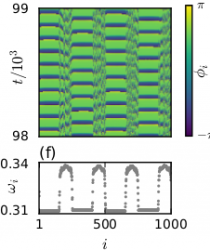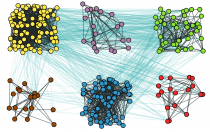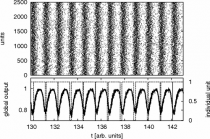Synchronization

Chimera states in network-organized public goods games with destructive agents
It is shown that a network-organized metapopulation of cooperators, defectors and destructive agents playing the public goods game with mutations, can collectively reach global synchronization or chimera states. Global synchronization is accompanied by a collective periodic burst of cooperation, whereas

Chimera states in network-organized public goods games with destructive agents
It is shown that a network-organized metapopulation of cooperators, defectors and destructive agents playing the public goods game with mutations, can collectively reach global synchronization or chimera states. Global synchronization is accompanied by a collective periodic burst of cooperation, whereas

Chimera-like states in modular networks
Inspired by the ancient Greek mythological creature Chimera (χίμαιρα) which had a lion’s head, a goat’s body and a serpent’s tail, Abrams and Strogatz [1] coined the term “chimera states” for the counterintuitive self-organized phenomenon in which synchronous and desynchronous

Chimera-like states in modular networks
Inspired by the ancient Greek mythological creature Chimera (χίμαιρα) which had a lion’s head, a goat’s body and a serpent’s tail, Abrams and Strogatz [1] coined the term “chimera states” for the counterintuitive self-organized phenomenon in which synchronous and desynchronous

Two-state exitable systems
A two-state unit is considered as an abstract modification for an excitable system. Each state is characterized by a different waiting time distribution. This non-Markovian approach allows for a renewal process description of the system dynamics. Exact formulas for the

Two-state exitable systems
A two-state unit is considered as an abstract modification for an excitable system. Each state is characterized by a different waiting time distribution. This non-Markovian approach allows for a renewal process description of the system dynamics. Exact formulas for the